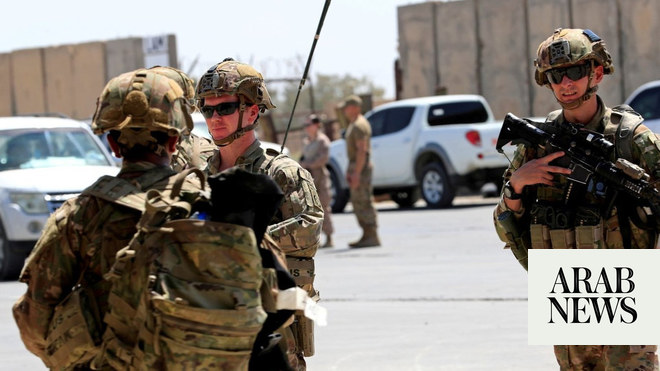
SOUSA, Syria: US-backed forces consolidated their positions around Daesh’s last redoubt in eastern Syria Friday as the country’s devastating conflict entered its ninth year with more than 370,000 dead.
All that remains of a once sprawling proto-state that the Daesh extremists declared in 2014 is a battered riverside camp in the village of Baghouz near the Iraqi border.
The Kurdish-led Syrian Democratic Forces (SDF), and warplanes of a US-led coalition backing them, have rained fire on the enclave since Sunday, blitzing thousands of Daesh members into surrender.
The Kurdish-led force said “1,300 terrorists and their families” gave themselves up on Thursday alone as its fighters slowed their advance to allow them to exit the enclave.
AFP correspondents on the ground said Thursday night was relatively calm apart from limited air strikes, as the SDF said its fighters were consolidating their positions after extremist counter-attacks and foiled suicide bombings.
The force was “consolidating and rotating its troops,” an SDF spokesman told AFP.
“There are still women and children who want to surrender, so we are obliged to slow down operations,” Jiaker Amed said in the neighboring village of Sousa.
“Operations risk being slowed again today to allow more departures of jihadists and their families,” Amed said, but he was unable to give an estimate for the number of people left inside Baghouz.
“Those left are strongly attached to the (extremists’) ideology,” he said. “There are a lot of suicide bombers but there are also families and children.”
Since the months-old SDF offensive resumed on March 10, 3,000 IS suspected members have surrendered, according to the SDF.
A total of about 60,000 people have streamed out of Daesh-held territory since December, the Britain-based Syrian Observatory for Human Rights says, a tenth of them suspected extremists.
The exodus has sparked a humanitarian crisis in Kurdish-held camps for the displaced, where women and children have arrived exhausted after weeks of siege.
These include the wives and children of alleged foreign extremists, hundreds of whom are being held by the Kurdish forces.
The International Rescue Committee says 120 people — mainly young children — have died on their way to the camp or after arrival.
Eight years of war in Syria have left more than 370,000 people dead including 112,000 civilians, the Syrian Observatory said, raising its last toll of over 360,000 issued in September.
The Britain-based monitoring group, which has a network of sources across Syria, said that more than 21,000 children and 13,000 women were among the dead.
The conflict flared after unprecedented anti-government protests in the southern city of Daraa on March 15, 2011.
Demonstrations spread across Syria and were brutally suppressed by the regime, triggering a multi-front armed conflict that has drawn in foreign powers and militant groups.
Over 125,000 Syrian government soldiers and pro-regime fighters figure in the latest death toll, the Observatory said.
It said other fighters, including rebels and Kurds, accounted for 67,000 of those killed.
Almost 66,000 were extremists, mainly from Daesh and Hayat Tahrir Al-Sham (HTS), dominated by Al-Qaeda’s former affiliate in Syria.
The devastating conflict has displaced or sent into exile around 13 million Syrians, and cost almost $400 billion in damages, according to the United Nations.
With the support of powerful allies Russia and Iran, President Bashar Assad has won his war for political survival but his country is fractured and cash-strapped.
Having reversed rebel gains with a massive Russian intervention, Assad now controls almost two-thirds of Syria’s territory.
But key areas remain beyond regime control, including a swathe of the oil-rich northeast held by the SDF.
Idlib in northwestern Syria, held by HTS, is protected by a cease-fire deal between Ankara and Moscow which has seen Turkish troops deployed to the area.
Syria’s conflict is estimated to have set its economy back three decades, destroying infrastructure and paralysing the production of electricity and oil.
Assad, however, has regained control of key commercial arteries and started a tentative comeback on the Arab diplomatic scene.
Several countries have called for Syria to be reintegrated into the Arab League, from which it was suspended as the death toll from the uprising mounted in 2011.












